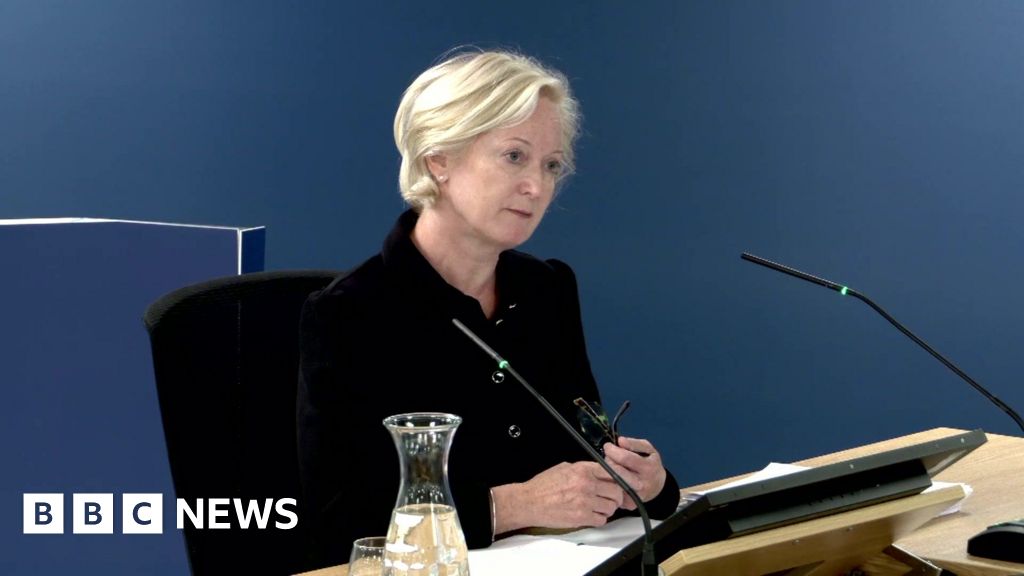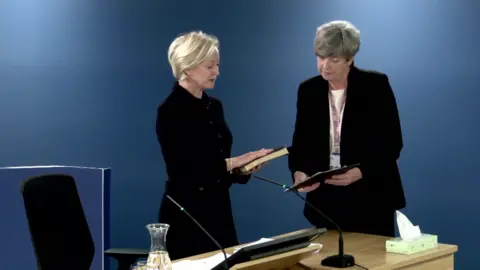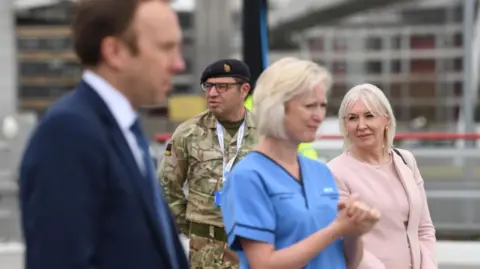Nurses have borne the brunt of Covid, former head nurse says

 BBC
BBCNurses have borne the brunt of the pandemic, with low staffing levels and difficulty accessing protective equipment, according to England’s former chief nurse.
Dame Ruth May told the Covid inquiry that the NHS was under pressure in 2020, partly because of the “catastrophic decision” to cut financial support for student nurses in 2015.
Resources were “stretched”, particularly in intensive care, he said, with a knock-on effect on the care some Covid patients received.
And it had been aware of widespread reports of problems supplying personal protective equipment (PPE) in March 2020, including a shortage of plastic gowns that had left frontline nurses living “in fear”.
“Fast moving environment”
Dame Ruth, England’s chief nurse from 2019 to July 2024, was one of the senior figures who appeared at Downing Street press conferences during the pandemic.
She had also volunteered for nursing shifts during Covid, sometimes working “under the radar” on hospital wards, the inquest heard.
“We faced some extraordinarily difficult decisions in the early part of the pandemic,” he said.
“It was a fast-moving environment – we saw (a large) number of cases coming in and deaths like we had never seen before.”
 Getty Images
Getty ImagesThe NHS entered the pandemic with around 40,000 nursing and midwifery vacancies in England, Dame Ruth said.
And he criticized a “catastrophic decision”, in 2015, to replace the scholarship or scholarship paid to midwives and student nurses with loans.
It would have led to a reduction of around 5,000 apprentices in England by 2020, Dame Ruth said, which “would have made a difference” in the pandemic.
“There would have been less burnout – there would have been less psychological impact,” he said.
Intensive care units have been under such pressure during Covid, specialist critical care nurses were responsible for up to six patients each instead of the usual one to one ratio.
And Dame Ruth accepted it had affected the care patients received, saying: “It wasn’t where we wanted to go… and I know there were consequences for that.”
Blanket do-not-resuscitate orders appeared to be added to some patients’ records based on their age or a pre-existing condition such as autism or a learning disability, he told the inquest, which was was “completely wrong”.
Online abuse
Dame Ruth also suggested that it had been a mistake for some hospitals to prevent pregnant women from being accompanied by their partners during scans or early labor.
The faster launch of Covid tests would have allowed visitors to return to the hospital sooner and be safer for staff and patients, he said.
Dame Ruth also spoke of the “pretty horrible” online abuse she faced at the time.
“The one thing I’ve learned about this whole (period), is the importance of integrity — and sometimes that comes at a cost,” he said.
“This means that on social media in particular you are vilified – (but) I was not the only one.”
The Covid inquiry is currently taking evidence on the impact on the NHS and health systems in all four nations of the UK.
More than 50 testimonies are expected to appear in this third section or “module”, which lasts until the end of November.
